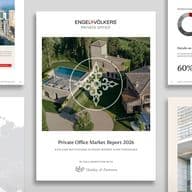
Sell successfully with Engel & Völkers
It's promising: Our worldwide network of earmarked prospective buyers.

Preparation is essential when it comes to selling a property. Do you want to sell your property? We are going to help you. The 9 documents you need to obtain are given below, together with some tips to follow.
The first thing to do is contact your notary. Your notary will advise and inform you on the steps to come. So be proactive and attend to all the useful formalities to have as complete a file as possible. Preparation is therefore the key to avoiding any mishaps afterwards.
Finally, obtain the following documents as soon as possible.
This is the identity card of the property, the notarial deed of purchase of the building drawn up by the notary when you acquired your home. If you inherited your property, have your inheritance certificate and any deed of purchase of the deceased ready.
If measurements were carried out by a surveyor, keep a copy of the plan he drew up. Keep also any particular agreements concluded with neighbours (fences, adjoining buildings, etc.).
If you are letting the building, make sure you provide the future buyer with all information about the rental situation of your property, such as the lease, the inventory of fixtures, indications concerning the rent guarantee, the amount of the rent paid, charges, etc.
You are required to include the PEB certificate in the sale announcement and to submit it to the future buyer before the provisional contract of sale is signed. You must apply to obtain the certificate from an accredited certification body. This certificate is valid for 10 years. If you have carried out works to improve the building energy performance during this period, you are advised to obtain a new certificate. Do not forget to renew the certificate when the 10-year term has expired.
The PEB is essential for the future owner, because it indicates whether a dwelling is economical in terms of energy (“passive” or otherwise). The buyer will thus be able to determine the energy cost of the building and compare it with other properties.
Click here for a list of authorized certification bodies
Pay attention to the good quality of the soil and make sure that it is not polluted. If your soil is polluted, the relevant legislation (which differs from region to region) will require studies and measures before issuing a certificate of conformity.
The institutions differ depending on the location of your property. In the Brussels or Flemish region, you are required to apply for a certificate attesting that the soil is not polluted from the IGBE (Brussels) or OVAM (Flanders).
In Wallonia, if you are aware of pollution, you must inform the buyer and the notary. Orientation or characterization studies will be conducted, depending on the case. You may also have to proceed to remediation or take safety or monitoring measures.
By way of reminder, this certificate must be obtained before the deed is signed.

It's promising: Our worldwide network of earmarked prospective buyers.
If your property is a house or an apartment, you must provide a certificate of inspection of the electrical installation in your building. This inspection must be carried out by an accredited body. It is intended to inform the buyer of the state of the installation.
Consult the list of accredited inspection bodies for electrical installations.
In the sale announcement, mention the most recent land use designation of the building and information about the town planning permits and certificates. Additional information may have to be provided depending on the region.
This information is available at the town hall. You must also obtain cadastral information, with a plan, in advance.
In the case of jointly owned apartment or property, inform the buyer about his future relations with the other joint owners. You must provide the joint deed, the joint ownership regulation and internal rules of procedure, the minutes of ordinary and extraordinary meetings for the last three years, the periodic statement of charges for the last two years, a copy of the last balance sheet approved by the general meeting, the amount of the operating fund and the reserve fund, the amount of any arrears due, the situation of calls for funds for the reserve fund as decided by the general meeting before the stipulated date for the transfer of ownership.
A leakage inspection by an accredited technician is required in the Walloon Region if your tank has a capacity of 3000 litres or more. A “Class 3” environmental declaration must also be made to the municipality. But there is no inspection requirement if your tank contains less than 3000 litres.
There is no regulation in the Brussels Region. Conversely, if your tank is above ground, and contains 3000 litres or more, make a declaration or obtain an environmental permit.
Fuel oil tanks are also subject to inspections in the Flemish Region.
For more information on the regulations applicable in each region, click here
This dossier describes all the works carried out on the property since 1 May 2001. It is intended to prevent risks during any subsequent works on the property. It consists in particular of an inventory and a description of the works carried out (plan, materials, estimate, invoices, specifications, photos, etc.), and must be drawn up either by a safety coordinator or the owner. It is handed to the buyer when the deed is signed.
If you have more questions or are ready to sell your property, contact one of our agencies promptly to proceed to the next step.
Our agents will be delighted to answer your questions.
You may also be interested in



&w=1920&q=75)


&w=1920&q=75)
&w=1920&q=75)
Contact


Engel & Völkers Belgium
Chaussée de Waterloo 1173
1180 Uccle, Brussels
Tel: +32 2 880 40 21